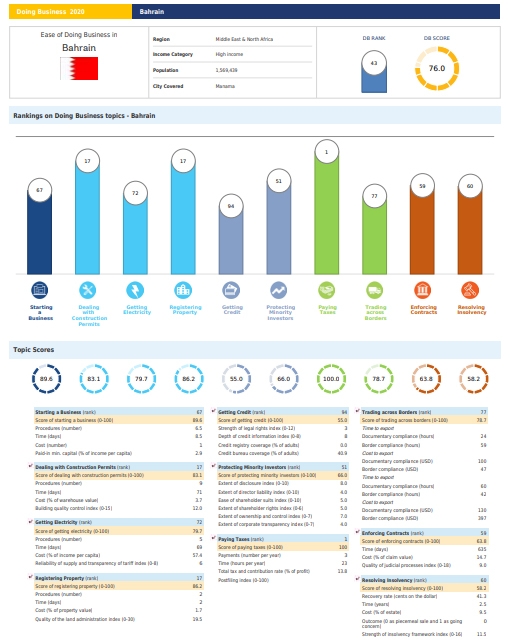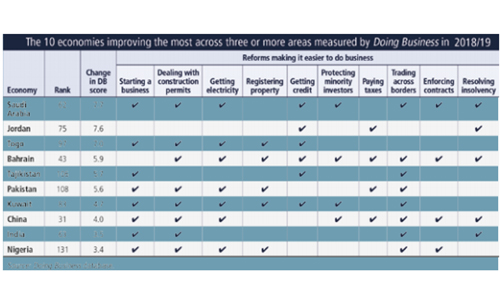Bahrain leads the world in reforms
Bahrain is among the World Bank Group’s top ten economies where business climates improved the most, according to the Doing Business 2020 study which recognises the work countries have done to improve their regulatory environment.
The study which reviews 190 economies says Bahrain implemented the highest number of reforms, improving in nine out of ten areas measured by the report. Bahrain also led both the region and the world in the number of reforms implemented. China and Saudi Arabia followed with eight reforms each.
The report says that Bahrain’s recently introduced new bankruptcy law strengthened the rights of minority shareholders and revamped the process of obtaining building permits through a new online platform. Besides, the Kingdom made enforcing contracts easier by creating a specialised commercial court, establishing time standards for key court events and allowing electronic service of the summons. Bahrain is also ranked as the best performer globally in tax compliance time, requiring just 22.5 hours per year to file and pay taxes.
To bring that into perspective, Saudi takes 104 hours and UAE 116 hours per year to file and pay taxes. The 10 areas measured in the report are: starting a business, dealing with construction permits, getting electricity, registering property, getting credit, protecting minority investors, paying taxes, trading across borders, enforcing contracts, and resolving insolvency. One additional area, employing workers, is also measured but is not included in the rankings.
Ranks second in MENA
The United Arab Emirates (UAE) remains the highest-ranked economy in the Middle East and North Africa region (16), followed by Bahrain (43) and Morocco (53). Iraq (172), Syria (176), Libya (186), and Yemen (187) are the lowest-ranked economies in the region.
For starting a business, Bahrain (ranked 67) takes 8.5 days, while immediate neighbour Saudi Arabia (38) takes 10.5 days. Top-ranked UAE (17) needs just four days. To provide construction permits, Bahrain (17) takes 71 days, while Saudi (28) takes 100 days. UAE (3) does that in 47.5 days.
Bahrain (72) takes 69 days to provide a new electrical connection where Saudi (18) takes 35 days and UAE (1) 7 days.
Need for diversification
The report says there is an urgent need for economic diversification- on a steady rise- which is partly driving reforms across the Gulf economies. Economies in the region implemented the most reforms on record to ease doing business for domestic enterprises -- 57 business regulatory reforms, up from 43 during the previous 12-month period covered by the study. The region thus hosted four of the most improved countries world-wide: Saudi Arabia, Jordan, Bahrain, and Kuwait accounting for “almost half of the region’s reforms.”
Regional highlights: Saudi Arabia
Saudi Arabia, the report says, this year’s top improver (based on the increase in its overall ease of doing business score), carried out a record of eight reforms in the past year. Reforms included establishing a one-stop-shop for business registration procedures, introducing a secured transactions law and an insolvency law, improving protections for minority investors, and measures to empower women economically.
Kuwait
Kuwait earned a spot in the top 10 improvers for the first time with seven reforms. The kingdom took measure to streamline the issuance of building permits, made cross-border easier by enhancing the customs risk management system and implementing a new electronic clearance system.
UAE strongest
The United Arab Emirates remained the strongest performer overall in the region, placing 16th on the ease of doing business rankings. UAE, Egypt, and Oman implemented four reforms each. All three strengthened the rights of minority investors, streamlined business registration processes and made it easier for businesses to import and export goods.
Electricity, protecting minority investors
Overall, the region performs the best in the areas of paying taxes, getting electricity, and dealing with construction permits. However, some economies in the region still fall short. Libya has not implemented any reforms since the inception of Doing Business, while Iraq has improved on only four indicators.
Lebanon has made one reform to improve its business climate in the last five years and seven reforms since the first launch of the Doing Business study in 2003.
Getting credit not easy
Getting credit in the Middle East and North Africa remains harder than anywhere else in the world. The region also underperforms in the areas of trading across borders and resolving insolvency. The cost of complying with border requirements for exporting averages $442 and takes 53 hours, three and four times more than the averages among OECD high-income economies.
In bankruptcy, the average recovery rate in the region is 27 cents on the dollar, compared with 70 cents in OECD high-income ones. Doing Business finds that barriers against women are still widespread in the Middle East and North Africa, with 13 of the region’s economies imposing additional procedures for female entrepreneurs to start a business.
Global rankings
The ten economies scoring the highest on the ease of doing business rankings were New Zealand, Singapore, Hong Kong SAR China, Denmark, Republic of Korea, United States, Georgia, United Kingdom, Norway, and Sweden.
Top performers typically had online business incorporation processes, electronic tax filing platforms, and online procedures for property transfers.
Related Posts


